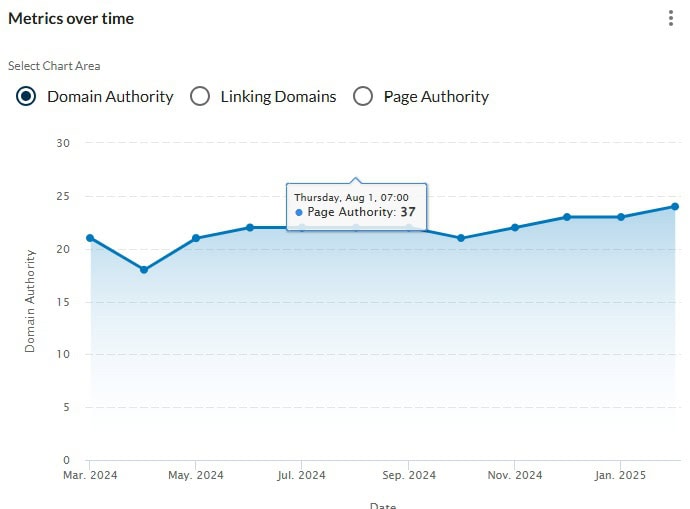Last Updated on May 21, 2025 by Ewen Finser
As a self-proclaimed SEO geek, I find it interesting how many enterprise-level SEO platforms boast having the best capabilities, each offering their own unique strengths and benefits. But it’s the nuance I’ve come to appreciate. While it’s tempting to search for one perfect all-encompassing solution, the reality is that different tools excel in different areas.
It’s a realization that struck me again recently when helping a client compare tools for their large-scale SEO operations. The decisions came down to Moz Pro and Conductor, both highly respected options. The challenge lies in discovering which platform best aligns with your specific strategy.
Are you struggling to decide which of these platforms is the “right fit” for your organization’s SEO needs? Having spent considerable time working with both these tools, I’ve compiled this breakdown to help you identify which will better align with your current marketing efforts.
The Short Answer:
If your primary marketing focus at this time is on deeper, more technical SEO analysis, you will benefit from the established authority metrics and detailed keyword research offered by Moz Pro. However, if your strategy is more focused on the greater content lifecycle and extensive collaboration between the SEO and content teams, you may find the features provided by Conductor better serve you and your team.
I personally rely more on SEO tools for organic visibility, and this is where Moz shines. It has all of the traffic data, search insights, and rank tracking, available lightning fast. Unlike other suites I've tried, Moz is quick with little lag time.
Moz Pro vs. Conductor: Head to Head
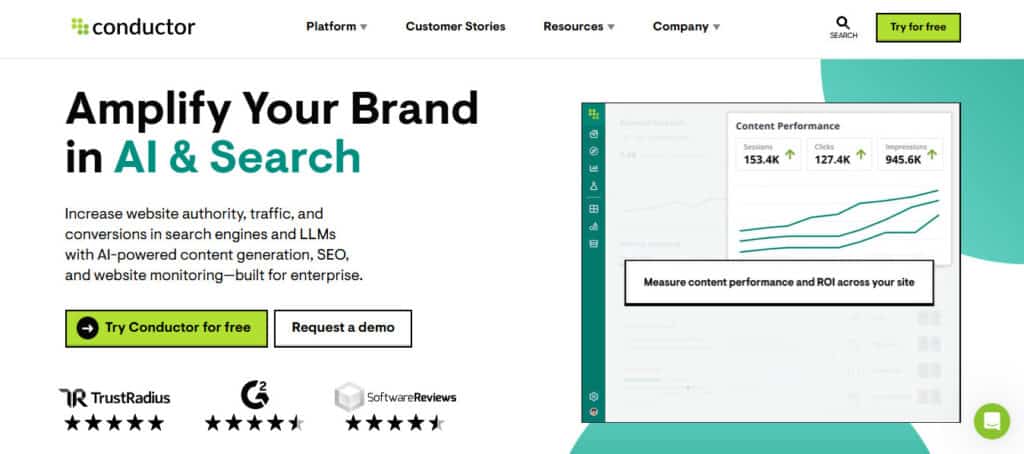
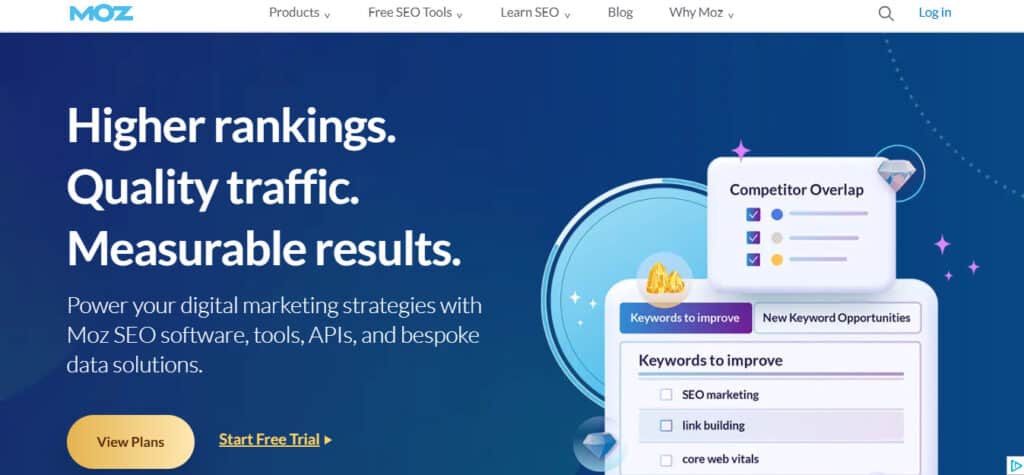
Keyword Research
Moz Pro offers a powerful research suite that arms you with actionable metrics to help you make strategic search decisions, like keyword difficulty, the predicted organic CTR, and a recommendation for the Domain Authority (DA) needed to rank, based on their well-known DA rating system.
One feature I found especially helpful was the inclusion of primary search content. This consideration has only become more important in recent years with the latest algorithm updates and the shift to consideration of AI search. Yet, it’s still missing from the data in most keyword research tools!

While Conductor also provides keyword data, it emphasizes finding content opportunities and how a specific keyword phrase can fit into your greater content strategy. It lacks the depth of detailed data provided by Moz, with only limited information about the search trends. However, the more I explored the tool, the more obvious it became that granular data like Moz was not their intention.
Instead, the Research tool paints a clear picture of the greater content impact of a specific keyword phrase. This includes a demographic analysis of who searches a specific search query, including their other interests, occupation, geographic region, and their general sentiment as it pertains to the phrase.
Additionally, after identifying a keyword of interest, you can click through to Conductor’s Content Guidance tool for additional information related to creating optimized content, including suggested secondary keywords, content analysis recommendations, and a list of the top competitors.
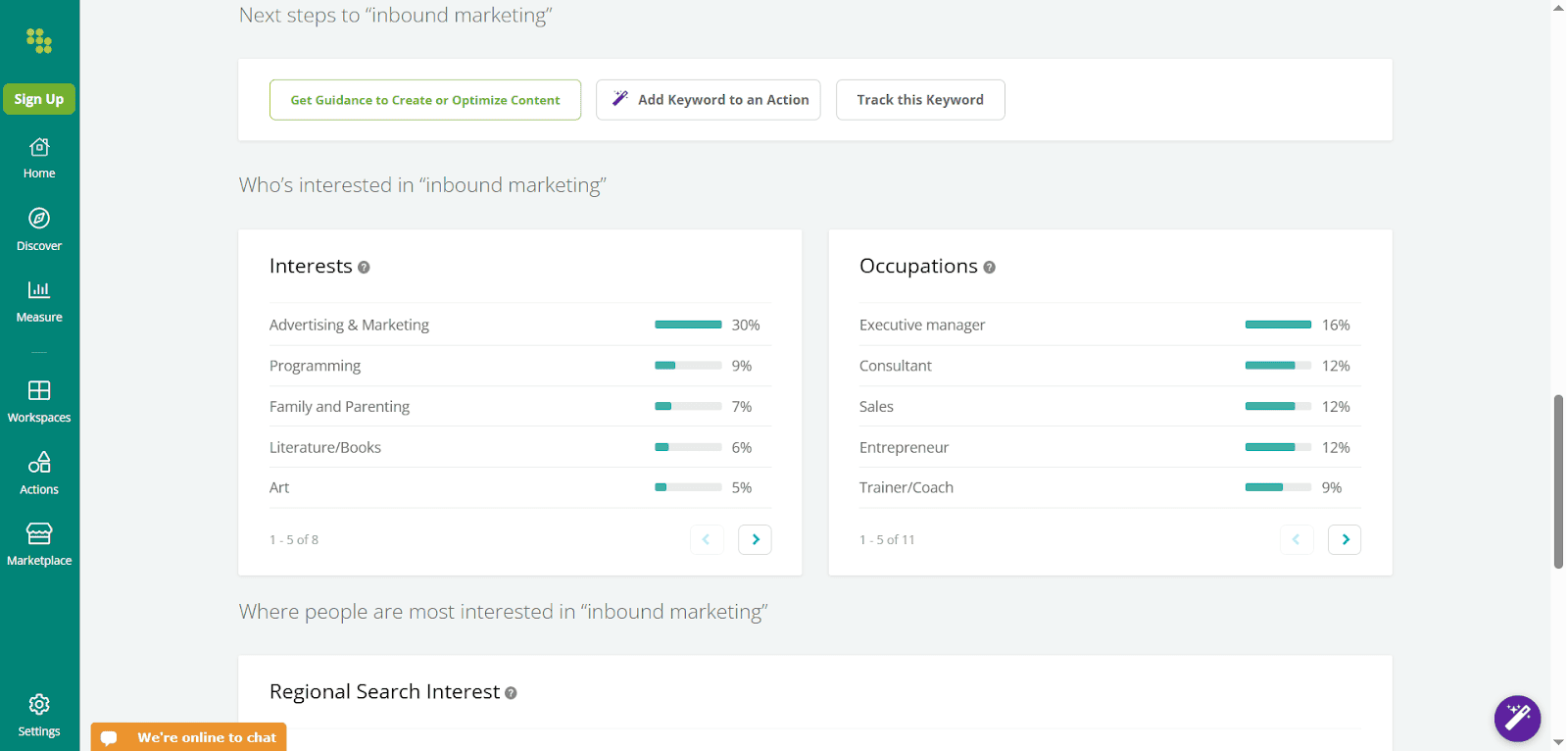
Rank Tracking
Both Moz Pro and Conductor offer reliable rank tracking capabilities, allowing you to easily track your search performance and the ROI of your SEO efforts. However, their emphasis and integration differ.
I found Moz Pro to be a reliable rank tracking option. By including historical search performance, I felt I was given all the information necessary to clearly understand my keyword performance and any fluctuations I may be experiencing. The tool also provides mobile ranking data, which is key in the current mobile-first environment.
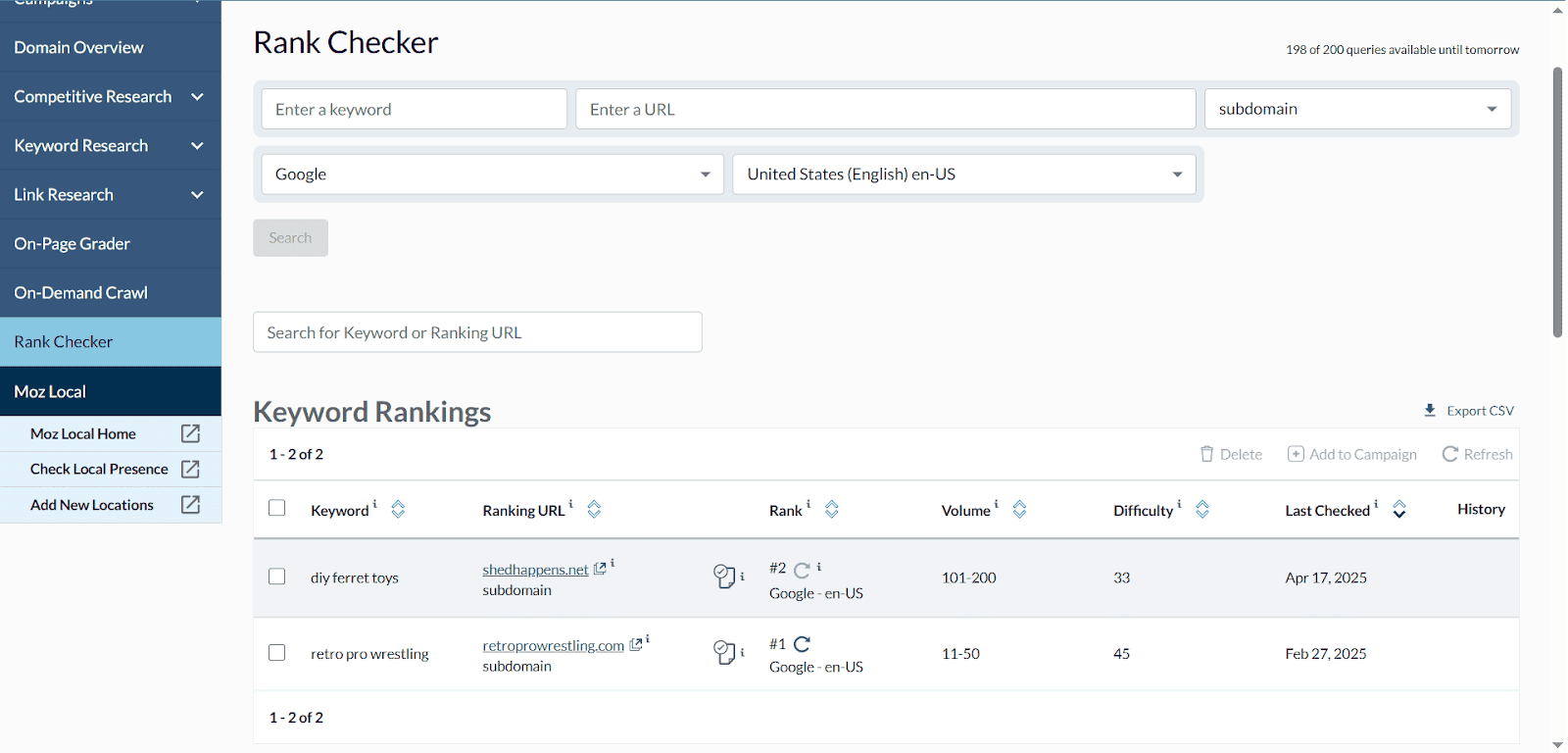
Conductor integrates rank tracking in a way that is focused specifically on analyzing your content performance. While it tracks keyword positions like most tools, the data is presented with a greater focus on the context of overall content performance by making it easy for me to see which content pieces were driving the most visibility for target keywords.
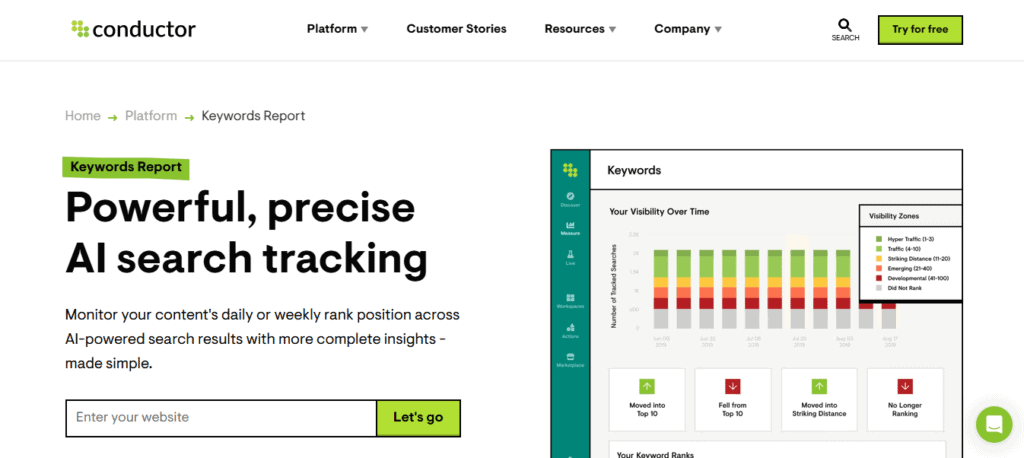
Backlink Analysis
Understanding your website’s authority and the possible link-building opportunities is a critical aspect of SEO, and one that a solid SEO tool should support. Both Moz Pro and Conductor have features that make this analysis feel seamless.
The Moz Pro backlink analysis tool, Link Explorer, is well-known and respected in the industry, and for good reason. The tool leverages their proprietary Domain Authority metric to not only identify the links, but also the value they represent based on site strength. In addition to identifying links, I found the in-depth insights, including anchor text, new and lost links, and spam score analysis, to be helpful in creating an actionable backlink plan. The Link Intersect feature is invaluable for identifying potential link opportunities by comparing your profile with your competitors.
Conductor’s backlink data is formed by integrating with third-party providers. This means you have access to extensive backlink information. Still, the experience isn’t as seamless as Moz’s native tool, as it combines several different data sources in a single dashboard. Much like the tool’s rank tracking feature, their backlink analysis is focused on overall content authority and performance.
Competitor Analysis
Staying ahead of the competition and clearly understanding the competitor landscape are both high priorities for me when trying to create a solid SEO strategy. This makes the competitor analysis features a critical consideration when choosing a tool to support my efforts.
Moz Pro focuses heavily on comparing top-performing keywords and rankings. The visual comparisons make it easy to spot my strengths and weaknesses relative to my competitors. It also does a good job of comparing backlink profiles, a key factor that should be considered when analyzing search performance and opportunities.

I was very impressed with Conductor’s competitor analysis features, as it stands out from other tools as it takes a unique approach by focusing on competitive content analysis instead of approaching it from a keyword angle. This allows me to easily analyze the top-ranking content for target keywords, identify key themes and topics being covered, and find content gaps that competitors successfully address. It’s an actionable approach that I believe will help drive the creation of more competitive content.
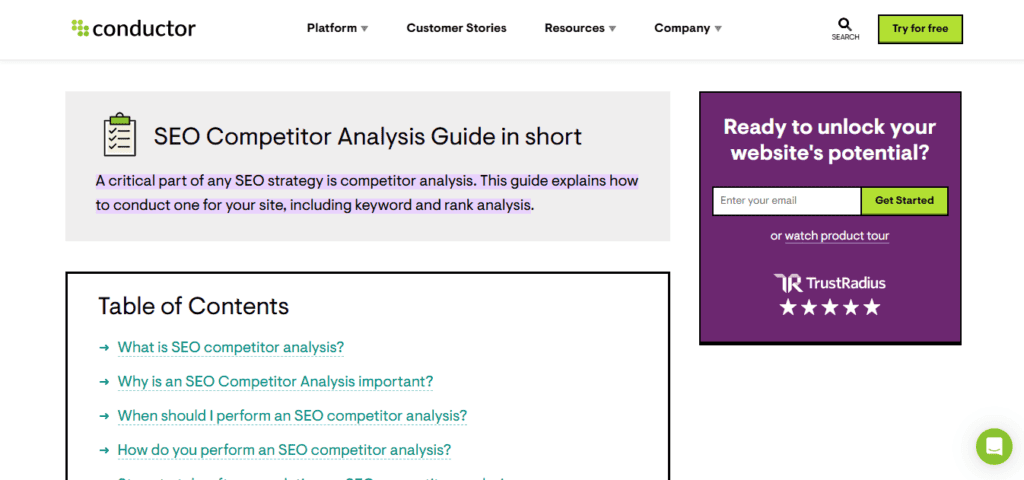
Side Auditing
Maintaining the technical aspects of your website can be a lot of work, but it’s necessary for SEO success. That said, I appreciate a tool that can help me identify and address potential problems.
Moz Pro’s Site Crawl effectively identifies key technical SEO issues like duplicate content, crawl errors, and missing meta tags. In addition to highlighting the issues, the platform provides clear explanations of the problem and easy-to-follow recommendations to resolve them. Additionally, an On-Page Grader lets you quickly audit the SEO touchpoints for a single piece of content and a focus keyword, helping you optimize your content for success.

Conductor also offers auditing capabilities. However, I found that the depth of the analysis it provided and its recommendations were not nearly as extensive as those offered by Moz Pro. It addressed the potential concerns related to content crawlability and indexability, if you’re looking specifically to focus on those elements. But it was clear that if I wanted to do a full site audit, I would need to pair this with another tool.
Reporting
Both platforms offer clear and easy-to-navigate reporting, which I believe is crucial for communicating your SEO performance and insights effectively.
Moz Pro’s reporting features allow you to create tailored reports for specific audiences, making it easy to share the data touchpoints necessary to help each department or individual understand the value of your search efforts. It also integrates data from Google Analytics, creating a single report that encompasses all the necessary metrics for a holistic view of your marketing performance.
Like many other aspects of the tool, the Conductor’s reporting is more focused on content performance. The data it provides highlights how content is driving traffic, conversions, and other key business metrics related to the impact of content marketing on the business. There is some SEO data, but it was clear that I wasn’t viewing an in-depth SEO report.
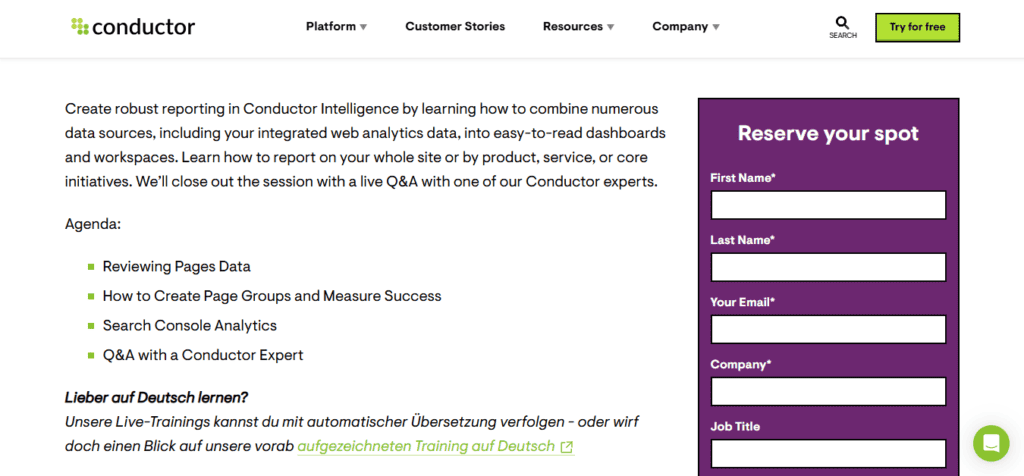
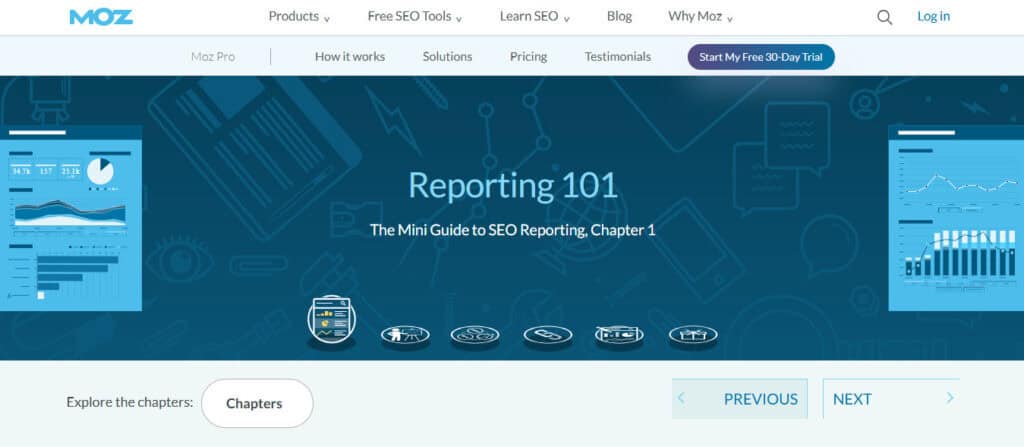
Pricing
Specific pricing details with these tools will vary based on your contract and usage, but it wouldn’t be a full comparison of the two without addressing the budget considerations. After all, few of us are working with an unlimited budget where this doesn’t impact our decision-making.
Moz Pro offers tiered subscription plans starting at $49/month for 1 user and 1 tracked site. The cost scales from there based on your needs.
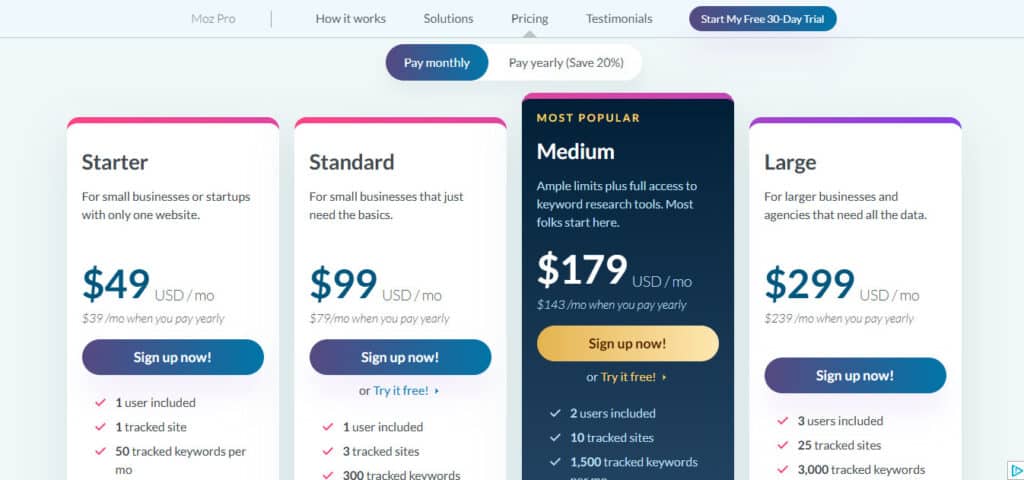
Conductor uses more of an enterprise-focused pricing model in that they state there are no fixed paid plans to choose from. Instead, they create a plan customized specifically to your needs. For exact pricing, you would need to speak with their sales team.
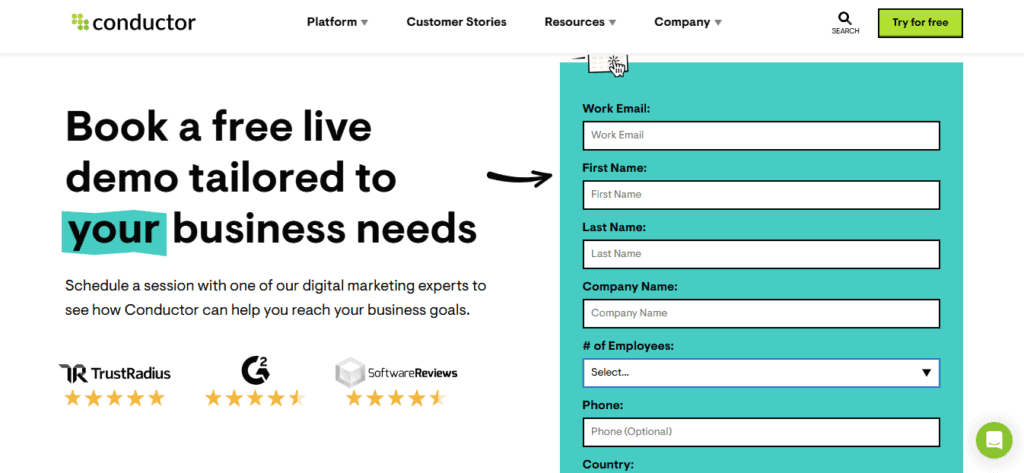
The Bottom Line: Which Tools Should Power Your Enterprise SEO?
Choosing between these powerful platforms can be challenging, as they both offer incredible benefits. You will need to consider the nuances of each tool and how it fits with your marketing goals.
Moz Pro’s comprehensive features are focused on in-depth SEO analysis, technical website optimization, and the impact of their unique authority metrics. It’s helpful for those looking for a tool to support a full website optimization effort. Conductor stands out with its emphasis on the content lifecycle and the use of content marketing to propel your marketing forward.
If your needs revolve around technical SEO, keyword insights, and a strong backlink analysis effort, Moz Pro may be a compelling choice. However, if your strategy is heavily content-driven, Conductor is a powerful solution that will deliver a competitive content analysis and bridge the gap between the SEO and content teams.
Both Moz Pro and Conductor are incredible tools and well worth the investment. Consider your team’s workflows, the scale of your content operations, and your primary SEO properties to identify the best option for your needs.
I personally rely more on SEO tools for organic visibility, and this is where Moz shines. It has all of the traffic data, search insights, and rank tracking, available lightning fast. Unlike other suites I've tried, Moz is quick with little lag time.


